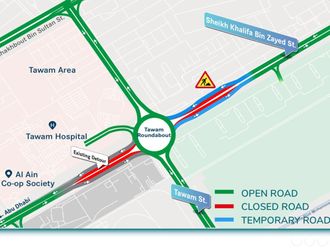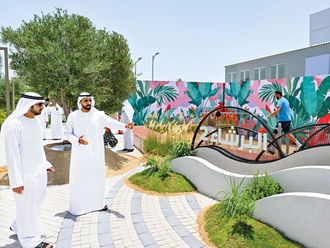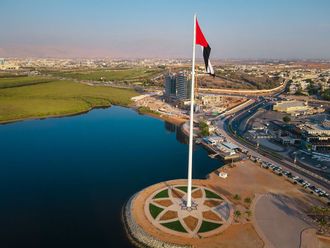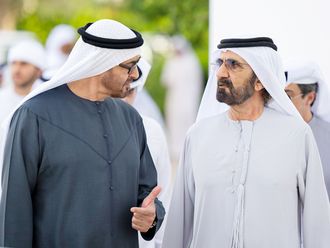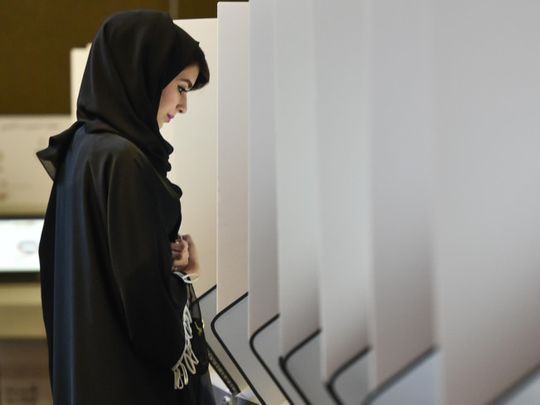
Abu Dhabi: About 337,738 Emiratis will cast their votes on October 5 in the Federal National Council (FNC) elections, the fourth in the nation’s history.
The parliamentary elections will, however, start early on with the early voting for the House from 1st to 3rd October at nine polling stations, according to the National Elections Committee, NEC.
The early voting is meant for senior citizens, people of determination and those who wish to cast their votes early because they will not be able to make it on the Election Day (October 5), which will run at 39 polling stations nationwide.
The NEC said voters can cast their votes at their nearest polling station, regardless of which emirate it is located, adding that they must produce their identity cards.
Each voter only has one vote during the same election cycle and can choose only one candidate.
The recently concluded overseas voting saw 1,842 Emiratis vote in polling stations around the world, reflecting their keenness to undertake their national duty.
Tariq Hilal Lootah, Under-Secretary of the Ministry of State for Federal National Council Affairs, Member of the NEC and Chairman of the Electoral Management Committee, said, “Today, we are starting a new phase of advancing parliamentary work, which will culminate in the participation of members of electoral authorities from all emirates, to undertake their national duty and vote for their chosen FNC candidates.”
Where early voting is held?
The early voting is held from October 1 to 3 in nine polling stations across the emirates (10am to 6pm).
The centres are:
Abu Dhabi National Exhibition Center (ADNEC), Abu Dhabi
Al Ain Convention Centre in Al Khabaisi, Al Ain
Madinat Zayed Wedding Hall, Al Dhafra
Dubai World Trade Centre, Dubai
Sharjah Chess Club, Sharjah
University of Ajman, Ajman
Expo Centre, Ras Al Khaimah
Etihad Hall, Umm Al Quwain
Fujairah Exhibition Centre, Fujairah
What is the Federal National Council?
The Federal National Council (FNC) is the UAE’s advisory council, formed under the UAE Provisional Constitution in 1971 as a permanent component of the country’s governing structure, which also includes the Supreme Council, President, Cabinet and Judiciary.
The House is composed of 40 members — eight from Abu Dhabi and Dubai; six from Sharjah and Ras Al Khaimah; and four from Ajman, Umm Al Quwain and Fujairah.
Twenty members will now be elected by the 337,738 members of the Electoral College. The other 20 will be nominated by their respective emirates.
Attended by the Rulers of each emirate and Cabinet members, the first session of the FNC was inaugurated by the late President Shaikh Zayed Bin Sultan Al Nahyan on February 13, 1972.
According to the Constitution, federal draft laws first have to pass through the FNC for review and recommendations.
Draft laws and amendments formed with help of specialised house committees are presented to the Council for discussion and later sent back to the Cabinet for consideration and approval.
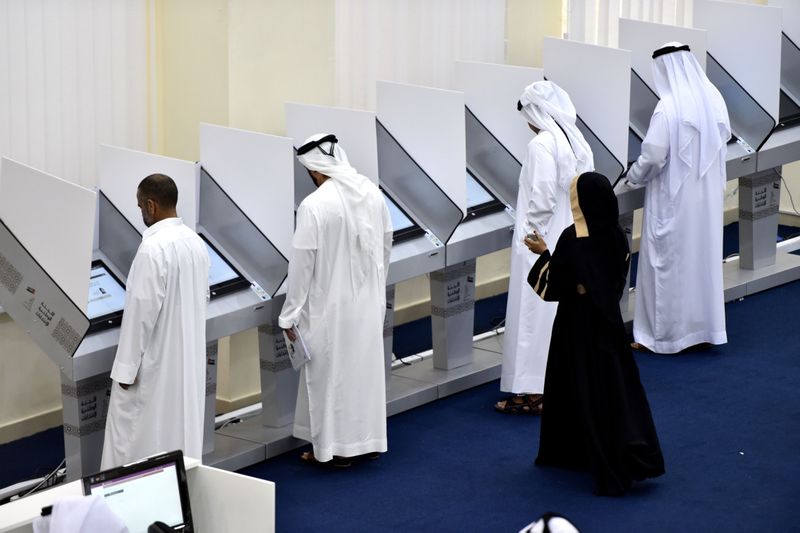
Throughout its history, the Council has influenced the Federal Government to draft laws. Original draft laws from the Cabinet were amended by the Council to suit the needs of the citizens which they represent.
The FNC is also seen as a forum where members are able to question ministers. Cabinet members are often grilled over issues of concern by members during debates.
The history of the Council also shows that the majority of its recommendations and amendments have been adopted and included in laws by the government.
An important element of the council is its specialised house committees, which examine draft laws and new rules.
The FNC is a member of the Inter-Parliamentary Union (IPU) as well as the Arab Parliamentary Union (APU).
How will the FNC elections work?
The UAE will hold 2019 elections on October 5, the fourth since the federation of seven emirates was established in 1971.
The elections are for half of the 40-member FNC. The other 20 representatives will be appointed by the rulers of the seven emirates.
Not all UAE citizens are allowed to vote or run for office. Only 337,738 citizens out of more than one million Emiratis are eligible to take part. Those eligible were chosen by the rulers of the emirates.
Women are allowed to vote and run for office and there is a 50 per cent quota to ensure 20 women get elected.
50 per cent more Emiratis to vote in FNC Elections
The majority of the pool of voters for the FNC elections are below the age of 40, representing 61.32 per cent of the electoral rolls.
The electoral rolls include 337,738 Emiratis eligible to vote in and run for the House elections, marking a 50.58 per cent increase over the 2015 list that included 224,281 Emirati electors.
The representation of Emirati women in the electoral college for 2019 increased to 50.62 per cent, compared to 49.38 per cent for men.
The voter pool features a significant representation of electors in the 21-40 age category, reflecting the crucial role of youth in the UAE’s progress.
Pool of voters
The pool of voters includes 101,549 members from Abu Dhabi, 60,772 from Dubai, 64,293 from Sharjah, 10,165 from Ajman, 6,653 from Umm Al Quwain, 55,289 from Ras Al Khaimah and 39,017 members from Fujairah.
Where you can find the list?
NEC has published the full electoral college list for the 2019 elections on its website (www.uaenec.ae). It has requested members of the electoral college to validate their names on the 2019 list using their Emirates ID numbers through a variety of channels, including its website and smart application.
Furthermore, the electors can contact the elections call centre on 600500005, and track their names or talk directly to the centre’s representative. They can visit the electoral committee office in their respective emirate for any clarifications.
In 2011, the number of members of the Electoral College was set at a minimum of 300 times the number allocated to the


